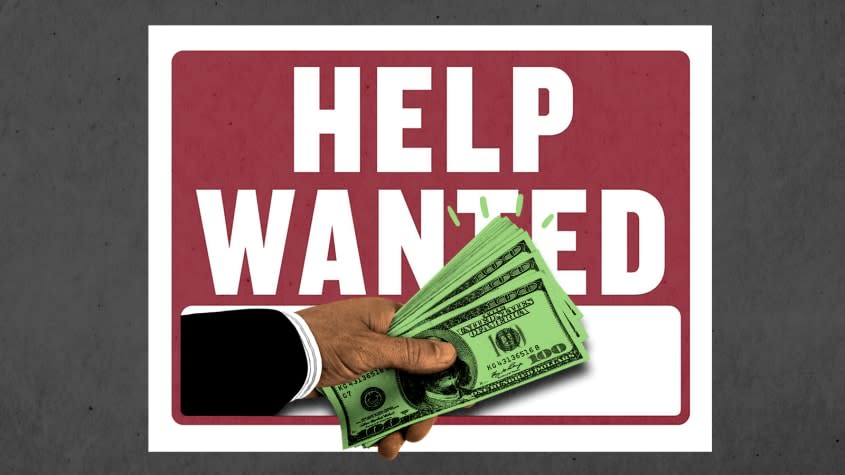If bosses want workers, they have to actually try

A class of Americans has become lazy and entitled. Too used to a government that caters to their every whim, they're facing a difficult situation not with grit and determination, but by throwing tantrums and demanding special treatment.
That's right, I'm talking about business owners. Complaints about a labor shortage abound, but it's time these coddled snowflakes learned some discipline. Employers need to put in the work to staff their own businesses instead of relying on the government do it for them.
The plain fact is we've had an employer's economy for a decade. After the Great Recession, unemployment was chronically high — only touching something like full employment in 2019, 11 years after the crash. Bosses got used to having the pick of the litter. With so many credentialed people thrown out of work, hiring managers were able to demand extravagant experience and over-qualification for low-level jobs. Many employers came to believe they were owed workers who would take any position and mutely absorb any abuse.
This sense of entitlement is a major reason both state and federal governments were so eager to end the boost to pandemic unemployment benefits. Without people lining up around the block to take crummy, low-wage positions, employers ran crying to the government for help.
But, as I wrote previously, their strategy didn't work. Some workers took early retirement when they got laid off last year; some parents can't find childcare at a reasonable price, so they are staying home; some workers saved up money during quarantine and would rather not work for the moment; and a great many workers are simply dead.
Meanwhile, among those actively in the job market, millions are changing careers. The pandemic has been a nightmare for the workers who keep America's rattletrap society staggering forward — the cashiers, cooks, nurses, truck drivers, meatpackers, child care workers, fruit pickers, and so on. It was one thing for overeducated millennials to scrape by in dead-end, low-wage jobs, like bagging groceries or getting screamed at while waiting tables. It was quite another to do so while at risk of gruesome death.
Simultaneously, the pandemic rescue packages have created a huge spending boom. Americans are buying stuff at a record pace, creating all sorts of snarls in shipping and production (in part because there was little excess capacity, again thanks to weak demand during the feeble post-2008 recovery). Higher-productivity firms are scrambling to expand, offering jobs with much better pay and benefits. This too puts a strain on employers whose business model is premised on exploited, low-wage labor.
Together, all this has given the American working class its greatest leverage in more than 20 years. People are quitting over pay, benefits, and working conditions. Thousands of workers are on strike at hospitals, tractor factories, and elsewhere. Thousands more may strike soon. Job applicants have turned the tables on employers, treating them with the same apathy they received after 2008 — ghosting hiring managers on outreach, interviews, or even job offers.
Employers don't like it, but they're finally recognizing something has changed. "Our governing body became very used to the job market conditions during the recession and for several years after where the employer had all the leverage," one anonymous public sector worker wrote on a manager discussion blog. "They are only now beginning to realize how the roles have reversed."
They need to realize it faster, and they need to learn how to entice workers. Better wages and benefits are the most obvious mechanism — indeed, we're already seeing wages rising strongly in sectors like hospitality, where jobs are notoriously poorly paid. Employers should also ditch the idea that they can always get someone perfectly experienced for every position. They'll need to train inexperienced people and offer extra training, raises, and new benefits to retain their existing workers.
There's also a less expensive strategy many employers may have to consider: shorter hours and employee say in workplace conditions. As Josh Eidelson writes at Bloomberg, one of the common demands of union workers currently striking or threatening to strike at John Deere, Kellogg's, and in Hollywood is more time off and safer working conditions. These workers are often quite well-paid, but they're sick of mandatory overtime, 12-hour shifts, 7-day weeks, and few vacation days. Onerous schedules leave people no time to relax and recharge — and can even be dangerous. A sleepy person should not be operating heavy machinery.
Overwork is also related to the lousy post-2008 recovery and employers' resultant entitlement. With a huge glut of labor, bosses got addicted to running their workforce ragged and economizing on health and safety systems. When grueling Amazon warehouse jobs destroy people's backs and knees, for instance, the company has typically hired new people instead of changing its practices. This cruel and lazy habit will have to be unlearned.
That will be difficult, because these problems didn't originate in 2008, though certainly the last decade exacerbated them. As I show in a paper for the People's Policy Project, average American working hours have barely declined since the 1970s, while hours have plummeted in all other rich nations. When you think about it, that's how things should work: As nations become wealthier and more productive, people should be able to work less and relax more. If Americans worked as little as Germans, for instance, we'd get almost 11 more weeks of vacation every year.
The pandemic has taught us that reasonable work conditions and plenty of time off are just as important as pay and other benefits. Money isn't much good if you can't enjoy it, and no job is worth your health or your life.
American workers know that now. If they want to have staff, American employers will need to catch up.
You may also like
5 riotously funny cartoons about Steve Bannon's contempt of Congress charge

 Yahoo Movies
Yahoo Movies 
